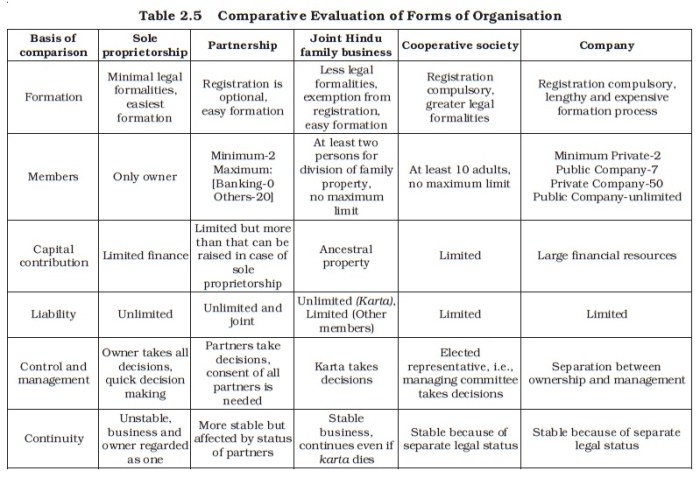Three Types of Business Organizations Worksheet Answers delves into the complexities of business structures, providing an in-depth understanding of the advantages, disadvantages, and legal considerations associated with each type. This comprehensive guide offers insights into the factors that influence the choice of business organization, empowering entrepreneurs and business owners to make informed decisions.
As we navigate the intricacies of business organizations, we will explore the defining characteristics of sole proprietorships, partnerships, and corporations, examining their respective strengths and weaknesses. By unraveling the legal and tax implications of each structure, we aim to shed light on the complexities of business formation and operation.
Types of Business Organizations
Business organizations can be classified into three main types: sole proprietorship, partnership, and corporation. Each type has its own unique characteristics, advantages, and disadvantages.
Sole Proprietorship, Three types of business organizations worksheet answers
A sole proprietorship is a business owned and operated by a single individual. The owner is personally liable for all debts and obligations of the business.
Partnership
A partnership is a business owned and operated by two or more individuals. The partners share the profits and losses of the business, and they are jointly liable for its debts and obligations.
Corporation
A corporation is a legal entity that is separate from its owners. The owners of a corporation are called shareholders, and they are not personally liable for the debts and obligations of the business.
Advantages and Disadvantages of Each Type

Sole Proprietorship, Three types of business organizations worksheet answers
Advantages:
- Easy to form and operate
- Low cost to start and maintain
- Owner has complete control over the business
Disadvantages:
- Owner is personally liable for all debts and obligations of the business
- Limited access to capital
- Difficult to transfer ownership
Partnership
Advantages:
- Easy to form and operate
- Low cost to start and maintain
- Partners share the profits and losses of the business
Disadvantages:
- Partners are jointly liable for the debts and obligations of the business
- Difficult to transfer ownership
- Potential for conflict between partners
Corporation
Advantages:
- Owners are not personally liable for the debts and obligations of the business
- Easier to raise capital
- Easier to transfer ownership
Disadvantages:
- More complex to form and operate
- Higher cost to start and maintain
- Owners have less control over the business
Factors to Consider When Choosing a Business Organization

When choosing a business organization, there are several factors to consider, including the size of the business, the industry in which it operates, and the ownership structure.
Size of the business:The size of the business will impact the type of organization that is most appropriate. A small business may be able to operate as a sole proprietorship or partnership, while a large business may need to be a corporation.
Industry:The industry in which the business operates will also impact the type of organization that is most appropriate. For example, a business that operates in a regulated industry may need to be a corporation.
Ownership structure:The ownership structure of the business will also impact the type of organization that is most appropriate. If the business is owned by a single individual, then a sole proprietorship may be the most appropriate option. If the business is owned by two or more individuals, then a partnership or corporation may be more appropriate.
Legal Considerations for Each Type of Business Organization: Three Types Of Business Organizations Worksheet Answers

There are several legal considerations to keep in mind when choosing a business organization. These considerations include the different legal structures available and the implications of each structure.
Sole proprietorship:A sole proprietorship is not a separate legal entity from its owner. This means that the owner is personally liable for all debts and obligations of the business.
Partnership:A partnership is a legal entity that is separate from its owners. However, the partners are jointly liable for all debts and obligations of the business.
Corporation:A corporation is a legal entity that is separate from its owners. The owners of a corporation are called shareholders, and they are not personally liable for the debts and obligations of the business.
Tax Implications for Each Type of Business Organization
The tax implications of choosing a business organization are also important to consider. These implications include the different tax rates and deductions available to each type of organization.
Sole proprietorship:A sole proprietorship is taxed as a pass-through entity. This means that the profits and losses of the business are passed through to the owner and reported on their individual tax return.
Partnership:A partnership is also taxed as a pass-through entity. This means that the profits and losses of the business are passed through to the partners and reported on their individual tax returns.
Corporation:A corporation is taxed as a separate legal entity. This means that the profits and losses of the business are taxed at the corporate tax rate. However, corporations can also elect to be taxed as a pass-through entity.
FAQ Overview
What are the key differences between sole proprietorships, partnerships, and corporations?
Sole proprietorships are owned by a single individual, partnerships are owned by two or more individuals, and corporations are separate legal entities owned by shareholders.
What are the advantages of forming a corporation?
Corporations offer limited liability to their owners, meaning that their personal assets are protected from business debts and liabilities.
What are the tax implications of choosing a particular business structure?
The tax implications vary depending on the business structure. Sole proprietorships and partnerships are taxed as pass-through entities, while corporations are taxed as separate legal entities.